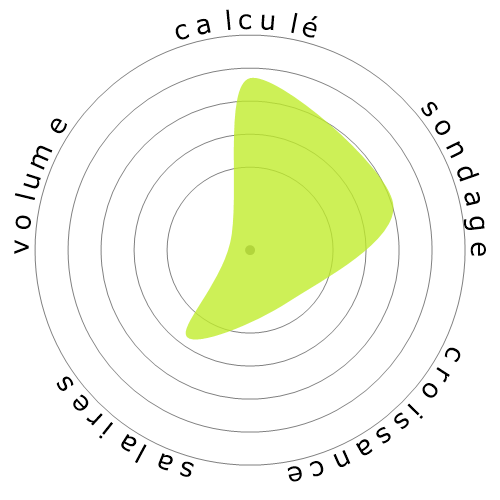Directeurs musicaux et compositeurs




Les gens ont également vu
Risque d'automatisation calculé
Risque Faible (21-40%) : Les emplois à ce niveau présentent un risque limité d'automatisation, car ils nécessitent un mélange de compétences techniques et centrées sur l'humain.
Plus d'informations sur ce que représente ce score et comment il est calculé sont disponibles ici.
Sondage utilisateur
Nos visiteurs ont voté qu'il y a peu de chances que cette profession soit automatisée. Cette évaluation est davantage soutenue par le niveau de risque d'automatisation calculé, qui estime 21% de chances d'automatisation.
Que pensez-vous du risque de l'automatisation?
Quelle est la probabilité que Directeurs musicaux et compositeurs soit remplacé par des robots ou l'intelligence artificielle dans les 20 prochaines années ?
Sentiment
Le graphique suivant est inclus chaque fois qu'il y a un nombre substantiel de votes pour rendre les données significatives. Ces représentations visuelles affichent les résultats des sondages utilisateurs au fil du temps, fournissant une indication significative des tendances de sentiment.
Sentiment au fil du temps (annuellement)
Croissance
On s'attend à ce que le nombre de postes vacants pour 'Music Directors and Composers' augmente 2,7% d'ici 2033
Emploi total, et estimations des offres d'emploi
Les prévisions mises à jour sont attendues 09-2025.
Salaires
En 2023, le salaire annuel médian pour 'Music Directors and Composers' était de 62 590 $, soit 30 $ par heure.
'Music Directors and Composers' ont été payés 30,2% de plus que le salaire médian national, qui était de 48 060 $
Salaires au fil du temps
Volume
À partir de 2023, il y avait 10 770 personnes employées en tant que 'Music Directors and Composers' aux États-Unis.
Cela représente environ < 0,001% de la main-d'œuvre employée à travers le pays
Autrement dit, environ 1 personne sur 14 mille est employée en tant que 'Music Directors and Composers'.
Description du poste
Dirigez, organisez, planifiez et menez des performances instrumentales ou vocales par des artistes musicaux ou des groupes, tels que des orchestres, des groupes, des chorales et des clubs de joie; ou créez des œuvres originales de musique.
SOC Code: 27-2041.00


Commentaires
Leave a comment
This is without taking into account all of the interpersonal elements of composition, which are also not well understood by people who don't do this work.
Finally, given that humans are subject to copyright law and that the level of imitation and inspiration from previous works is controlled and limited by these laws, it is unlikely that music created by AI that was not drastically reshaped by a human composer would avoid copyright lawsuits or be subject to copyright itself, as current technology in this field only knows how to aggregate and make stylistic choices based on probability. A human composer is not going to waste time fiddling with AI compositions to "get them there" when they could just write something themselves.
Show me an evangelist who actually produces music and isn't heavily invested in AI themselves in some way, and I'll reconsider.
bye bye dutse, hesh and koot
1. Which is understanding which part of what they created did a human like and thus may have trouble using reinforced learning.
2. Lyrics have meaning behind the words. Its much more complex than just a melody. Its these lyrics and building melody in combination with lyrics which is going to be rather difficult but not impossible. Lyric writing is going to be one of the Last things AI will be able to do.
https://www.youtube.com/watch?v=wYb3Wimn01s
Laissez un commentaire sur cette profession